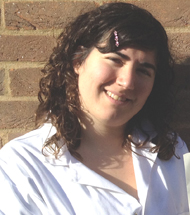A graduate of the School Sciences will do her postdoctorate at Cambridge University.
Alerie Guzman from source read her doctoral thesis related to multiple sclerosis at the English academic center.

PHOTO: Courtesy
Alerie Guzmán de la source, graduate in Biology and Biochemistry from the University of Navarra, will do her research postdoctoral at the University of Cambridge. After completing her doctoral thesis , the graduate will travel to Peru as a volunteer for an NGO and will make a trip to Argentina. In March 2015 she will join the English academic center for a postdoc at Prof. Franklin's laboratory , where she has already completed her doctoral thesis .
"My research at Professor Robin Franklin's laboratory focuses on studying the regenerative processes of the central nervous system, especially in demyelinating diseases such as multiple sclerosis and specifically on the regenerative process known as remyelination, as well as the molecular mechanisms responsible for it". This is a project in which business pharmaceutical company Medimmune is collaborating.
Alerie Guzman, a native of Alsasua, finished the double licentiate degree in 2009 and went to Milan where she worked in the Alzheimer's laboratory of Professor Monica di Luca through a scholarship PIE and a scholarship IBRO, financial aid awarded to Neuroscience researchers. Finally, he moved to Cambridge where he currently resides.
According to him,"studying at the University of Navarra offered me the possibility of pursuing two degrees at the same time, as well as friends with whom I collaborate today and the chance to develop professionally". Thus, he highlighted the wide internship opportunities, the option of being student intern of Departments and the Erasmus scholarships of the university, which were decisive for "obtaining the necessary knowledge and foundations to go out into the scientific world without doubts and with security. All this, together with the possibility of traveling to the University of Jena in Germany, encouraged my desire to do a doctorate abroad and I was fortunate to be able to do it at a university with a great scientific tradition and history such as the University of Cambridge".
